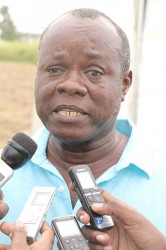Stakeholders who met last week to carve a path for the improvement of the New Opportunity Corps (NOC) have been urged to see young people as assets to society rather than problems.
Addressing the meeting, Presidential Adviser on Youth Empowerment Aubrey Norton referred to President David Granger’s choice to pardon a number of youth prisoners convicted for petty offences, noting that there was need for a reevaluation aimed at having juvenile offenders face reformative rather than penal justice in the interest of our youth population.

“…To make that change, we need quality leadership, leadership that has a clear vison and a clear plan and leadership that has the capacity to motivate persons to influence persons in the right direction,” he said.
“I believe that the time has come for a new leader, with a new vison, a new mission and a new approach, which suggests that we will reform NOC. What we need is a person who is professionally trained in sociology, social work and psychology, a well-rounded, multi-talented leader is required to move NOC forward,” he added.
Additionally, Norton highlighted the need to have juveniles undergo leadership skills’ training, noting that it is an essential aspect of the rehabilitation process for juveniles at the NOC.
“There is little sense in having young people there and they are not being trained to lead,” Norton stated.
He noted that there is a need for peer leadership since coaches are not always able to connect with juveniles in the manner their peers would. “… A lot of times we can’t lead 16-year olds, but if we train 16-year olds who understand 16-year olds, they would be able to lead their peers. Training these young people to be leaders in their own right, is a critical part of the process.”
Training, he said, is essential as it would facilitate attitudinal metamorphosis of the population at NOC.
“What needs the most training is their minds,” Norton explained while suggesting that in addition to equipping them with vocational skills, they should also be equipped with the necessary life skills to be model Guyanese.
Additionally, the advisor expressed the need to have reconnection mechanisms in place as part of the rehabilitation process, allowing juveniles to be able to reconnect with their families while they are committed to the organization. He noted that the situation of having a child or relative committed to the correctional facility creates a hiatus between juveniles and their families.
Using an interaction he had with a young woman housed at the institute as an example, Norton described the reconnection stage as being necessary. He explained that when he asked the girl where she saw herself after being released from the institute, she offered the opinion that she would have to return to the facility since her family may be unaccepting of the fact that she has indeed changed.
“This is saying to us that this has to be a part of the rehabilitation and reintegration process. We need to transform the way the family thinks, the way the child thinks and the way society thinks or we will have a repeat of these situations. NOC is an institution that has to be made a part of society,” Norton said.
Administrator of the NOC Mark Dover said that even though the institution has had its share of challenges over the years, it continues to strive to rehabilitate the juveniles through skills training, sports and other activities.
“We have 26 students in school at Essequibo, with 20 at Aurora Secondary and 6 at Johanna Cecilia Secondary. Additionally, we have taken part in boxing and debating [competitions] and have been successful in each field,” Dover noted.
Dover explained that the meeting aimed at developing a way forward for the betterment of the organization and by extension the juveniles who have been committed there.
“We have to work out new strategies and policies to try to improve, so children can be better trained and rehabilitated for when they are ready to be reintegrated into society at the end of their committal period at the NOC,” Dover said.
The meeting, which was held in the compound of the Racquet Centre, saw several groups from civil society coming together to develop new policies for the institute. Stakeholders included the Ministry of Social Protection, UNICEF, Guyana Prison Service, Guyana Responsible Parenthood Association, SKYE/USAID and the Ministry of Presidency Youth Empowerment Unit, among others.
The NOC has been the subject of much public comment in recent years. A Commission of Inquiry was convened into it following a mass breakout and fire in August of 2012. The final report was not released to the public but it pointed to a series of problems related to staffing and treatment of residents. Residents had complained about inhumane treatment at the facility including methods of solitary confinement. Plans for a controversial confinement building with cell-like structures also raised concerns.




